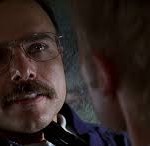Memento is an ingenious movie based on a simple premise and an elaborate conceit. The premise is that a man, Leonard Sheldon (Guy Pearce) is searching for the man (known only as John G) who raped and killed his wife, hell-bent on revenge. Oh, and he has a short-term memory condition necessitating him to use notes, Polaroid photos and his body as message pads to remind himself where he is, what he is doing and why he is doing it.
The conceit is that the film is mostly told in reverse order, skipping backwards every few minutes to explain how he got to where he was at that point, mixed with black and white intermezzos which develop chronologically t0 demonstrate his paranoia and tell the story of a man with a similar condition whose he had investigated while working in insurance. With me so far?
Next I had better mention that it was written and directed by Christopher Nolan, who some (mostly women, though that may be coincidental) regard as a god, and who went on to direct a trio of darker Batman movies, and the occasionally impenetrable Inception. In other words, he is regarded as a gifted director who does not pander to the lowest common denominator, and does not share the belief of studio execs that unless a movie is dumbed down to the lowest degree the movie-going public will run a mile.
Nolan respects the intelligence of his audience (meaning he thrives on complexity), and leaves you to piece together the assorted and occasionally haphazard clues littering his movies. You could say that regardless of theme and plot line, Nolan shoots in a hyper-realistic fashion, challenging you to keep a close eye on the minor details flagged graphically as things to take note of. Some might think this is the director playing tricks, perhaps even being condescending, but his mission is ultimately to entertain, and entertain he generally does with aplomb.
This is certainly true of Memento, a movie based on a story by Nolan’s brother Jonathan. The time reversal signature is not unique, but it is handled in an assured and accessible way. The complications come when the director does a selective striptease of the available information so you have to decide what is real and what is invented, whether the truth is as presented or is the complete flipside of what you’ve heard. Who is lying and can reality be taken at face value? Then there is the curious tale of Sammy Jankis and his wife. Now what is that all about? Some A-level Psychology might help here.
Since Memento is spoken of in the same breath as The Usual Suspects and The Sixth Sense, you will have guessed that there are various plot twists, culminating in a big whopper at the end. It’s quite an expected twist – I guessed it well in advance – but how it gets there is fascinating. Stylistically, it incorporates elements of film noir, especially through the cynical roving eye of the camera, the sexual motifs and inclusion of black and white segments.
But what differentiates Memento from many more action-based thrillers is the cerebral aspect. The point is that you are looking through the eyes of an untrustworthy man who is not what he seems, and are invited to psychoanalyse him. Freud would have had a field day! What separates Memento from many more action-based thrillers is that you are encouraged to think for yourself. This is not a movie to watch as, in Frank Lloyd Wright‘s memorable phrase, said of Television, “chewing gum for the eyes,” but as the detective trying to sort the red herrings from the bona fide facts.
If this movie has a weakness, it is that much more could have been made of the underlying themes concerning human memory and perception, but then Nolan knows his audience and avoids being overly ambitious. This may well be the secret of his success: complex is OK, but avoid pretension. You may well end up watching Memento more than once, and there are precious few thrillers that live up to that accolade.
Guy Pearce, an Aussie actor who started in soaps but then progressed to the excellent LA Confidential, seems to be enjoying greatly the bewildered nature of Sheldon. You can see the cogs whirring as he tries to elucidate what he has done, viewing himself in the third person – almost a stranger about whom he knows a lot but cannot fathom. The supporting cast of character actors do a fine job in setting him up: some are more devious than others, some rip him off, some are far less reliable than others.
Your task, Jim, should you choose to accept it, is to work out which is which, though in that respect you are Leonard Sheldon too. Neat, huh?










